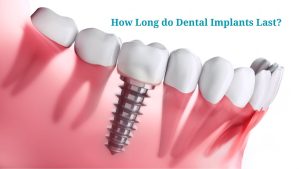Dental Implant Longevity: How Long Do Dental Implants Last
Today’s dental implants have revolutionized the field of dentistry, offering a permanent solution for those grappling with missing teeth. The longevity of these implants is a critical consideration for individuals seeking a lasting dental solution.
In this dental implant guide, we discuss the intricacies of implants, exploring the materials they are composed of, their lifespan, common issues affecting longevity, and essential tips to ensure your dental implants in Cedar Park stand the test of time.
Dental Implants: Materials, Lifespan, and Expert Tips
Understanding Your Dental Implant
At the core of dental implant longevity lies the composition of these innovative tooth replacements. Your implant consists of three key components:
- Implant: The Foundation of Stability
The implant itself serves as the foundation, typically crafted from durable materials such as titanium or zirconia. This small post is surgically embedded into the jawbone, mimicking the function of a natural tooth root and providing a stable base for the crown.
- Abutment: Linking Stability to Aesthetics
The abutment is a connector piece that fastens onto the implant, linking it to the visible part of the tooth replacement. This crucial element acts as a mediator, ensuring a secure attachment between the implant and the crown.
- Crown: The Visible, Functional Component
The crown is the visible part of the implant, crafted from ceramic to replicate the appearance and function of a natural tooth. While the implant itself is shielded within the jawbone, the crown is exposed and actively used during activities like biting and chewing.
It’s important to note that the crown and abutment are more vulnerable to wear and damage compared to the implant. Their exposure and active involvement in daily oral functions make them susceptible to the rigors of daily life.
How Long Will Your Dental Implant Last?
The lifespan of an implant is influenced by various factors including the materials used, the location within the mouth, and the owner’s habits. With diligent oral care, the implant screw can usually endure a lifetime, assuming regular dental check-ups every six months.
However, the crown typically has an average lifespan of approximately 10 to 15 years before it may require replacement due to wear and tear.
Maintaining impeccable dental hygiene and exercising caution in the use of your implant can extend the life of the crown beyond the typical 15-year mark.
Additionally, the location of the implant within the mouth plays a crucial role in predicting its longevity. Implants situated in the rear of the mouth, subjected to more rigorous chewing activities, can often be expected to wear out more quickly than those in the front.
Dental Implants Surgical Process and Their Impact on Overall Health
Dental implant surgery and dental implants in Cedar Park can positively impact health through:
- Improved Oral Health: Dental implants replace missing teeth, preventing further oral health issues and preserving the integrity of surrounding teeth and bone.
- Enhanced Chewing Ability: The ability to chew properly with implants can contribute to better nutrition and overall health, as individuals can maintain a balanced diet.
- Prevention of Bone Loss: Dental implants help prevent bone loss in the jaw, preserving the facial structure and preventing premature aging.
- Increased Confidence and Mental Well-being: Having a complete and aesthetically pleasing smile with implants can boost self-esteem and mental well-being, contributing to a healthier, happier life.
- Long-lasting Solution: Dental implants are a durable and long-lasting solution, often lasting a lifetime with proper care. This stability can contribute to overall health and well-being.
- Reduced Risk of Systemic Health Issues: Maintaining good oral health, including through implants, may contribute to a reduced risk of systemic health issues associated with poor oral hygiene, such as cardiovascular disease and diabetes.
- Preservation of Adjacent Teeth: Unlike traditional dental bridges, implants do not rely on adjacent teeth for support, preserving the health of neighboring natural teeth.
Common Factors Influencing Implant Longevity
Several factors can influence the longevity of your implants. Recognizing and addressing these issues proactively can contribute to the sustained success of your dental implant:
- Oral Hygiene Practices
Just like with your regular teeth, brushing and flossing are paramount in ensuring the longevity of your implant. Proper oral hygiene helps prevent complications such as gum disease, which can jeopardize the stability of the implant.
- Professional Dental Check-ups
Regular visits to your dentist in Cedar Park every six months are important for monitoring the health of your implant. Professional cleanings and assessments can detect potential issues early, preventing them from escalating and affecting the lifespan of your implants in Cedar Park.
- Cautious Use
While dental implants are designed to withstand normal oral activities, exercising caution in activities like biting into hard substances can prevent unnecessary stress on the crown and abutment. Likewise, exposure to extremely hot or cold temperatures can stress an implant crown just like the enamel of your natural teeth.
- Mouth Location
The location of the implant within your mouth matters. Implants at the back endure more force during chewing, making them more prone to wear and tear compared to those at the front.
Tips for Ensuring Your Dental Implants Last Longer
To maximize the longevity of your dental implants in Cedar Park, consider the following tips:
- Commit to Excellent Oral Hygiene: Brush and floss regularly to maintain optimal oral health and prevent complications.
- Attend Regular Dental Check-ups: Schedule biannual check-ups with your cosmetic dentist in Cedar Park for professional assessments and cleanings.
- Be Mindful of Your Implants: Avoid habits like teeth grinding, ice chewing, and biting into hard objects to prevent unnecessary strain on your implants.
- Consider Mouth Location: It is often impossible, but choose dental implants in less actively used areas to reduce the impact of daily wear.
- Invest in Quality Materials: When choosing implants, prioritize high-quality materials to enhance durability and longevity.
Why Dental Implants may be Ideal for You?
Choosing Reveal Dental for your implants in Cedar Park offers a host of benefits for individuals seeking a permanent and reliable tooth replacement solution. Unlike traditional dentures, implants in Cedar Park from Reveal Dental provide stability, functionality, and a natural appearance. With proper care and maintenance, implants can significantly enhance your oral health and overall well-being.
Conclusion
Understanding the lifespan of implants is crucial for individuals considering this tooth replacement option. The composition of implants, coupled with diligent oral care practices and strategic placement, contributes to their impressive longevity. By attending regular check-ups, and adopting cautious habits, you can ensure that your implants in Cedar Park stand the test of time, offering a lasting solution for your oral health needs.
FAQs
-
What is the expected lifespan of dental implants, and do they ever need to be replaced?
Dental implants are known for their longevity, often lasting a lifetime with proper care. However oral hygiene, overall health, and lifestyle habits can influence their lifespan. Sometimes the crown needs to be replaced, but the implant itself often lasts forever.
-
Is there a chance of dental implant failure, and what are the signs to watch for?
While implants have a high success rate, there is a small risk of failure. Signs of potential issues include persistent pain, swelling, or mobility of the implant. If any concerns arise, it’s crucial to contact your dentist promptly for evaluation.
-
Can dental implants shift or move over time?
Dental implants are designed to be stable and secure. However, poor bone integration or certain habits (like teeth grinding) can impact their stability. Regular dental check-ups and addressing any concerns promptly can help prevent complications.

Submitted by Dr. Alkesh C. Sura
Dr. Alkesh C. Sura is the founder and lead dentist at Reveal Dental in Cedar Park, Texas. A North Carolina native, Dr. Sura earned both his Bachelor of Science in Public Health and Doctor of Dental Surgery degrees from the University of North Carolina at Chapel Hill.






